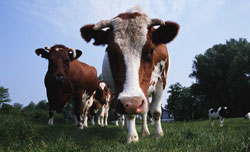Reading researcher's £1m grant to benefit British farming
Release Date 29 July 2015

University of Reading scientists have been awarded almost £1million to research how the diet of cattle could be altered to benefit farmers, consumers and the environment.
Professor Chris Reynolds, director of the Centre for Dairy Research and his colleagues in the University of Reading's School of Agriculture, Policy and Development, have been awarded £838,456 alongside further funding for collaborators at Rothamsted Research in North Wyke.
Their research will explore how diverse forage mixtures could optimise the production of milk and meat from ruminant animals, such as cattle and sheep. It is hoped that such developments will improve the efficiency of animal feed production, reduce the environmental impact of UK cattle and sheep farming and its dependency on feed imports, and boost wildlife biodiversity on British farms.
The award is part of a series of grants made by the Biotechnology and Biological Sciences Research Council (BBSRC) along with the Natural Environment Research Council (NERC) and 12 industry partners, who have announced funding for six research projects to improve the sustainability of UK farming.
The grants totalling £4.7M were funded in the first round of the Sustainable Agriculture Research and Innovation Club (SARIC), which was developed by BBSRC and NERC, together with industry, to support innovative projects that will provide solutions to key challenges affecting the efficiency, productivity and sustainability of the UK crop and livestock sectors.
Among the funded studies is work to improve the drought tolerance of wheat, research to determine the best foodstuffs for ruminant animal health and production, and a project focused on optimising the use of buffer strips to enhance hydrology and water quality.
Sustainable agriculture
Dr Celia Caulcott, BBSRC Executive Director, Innovation and Skills, said: "These studies will help address important challenges for the UK's farming industry, which is worth billions to our economy, and help progress towards sustainable agricultural systems for the future.
"The collaboration between industry and the Research Councils as part of SARIC will streamline the translation of findings from these studies into tangible benefits for producers and consumers, and help us meet the challenge of sustainably feeding a growing world population."
Iain Gillespie, NERC Director of Science and Innovation, said: "In the 21st Century the global food system faces significant pressures, not least from world population growth and climate change. These projects will help equip the agriculture industry with the knowledge and expertise it needs to find sustainable and affordable ways of meeting these challenges.
"By working with industry to identify big scientific questions and translate research into practical solutions, we can help ensure our world-leading science continues to deliver tangible benefits for our economy and society."
